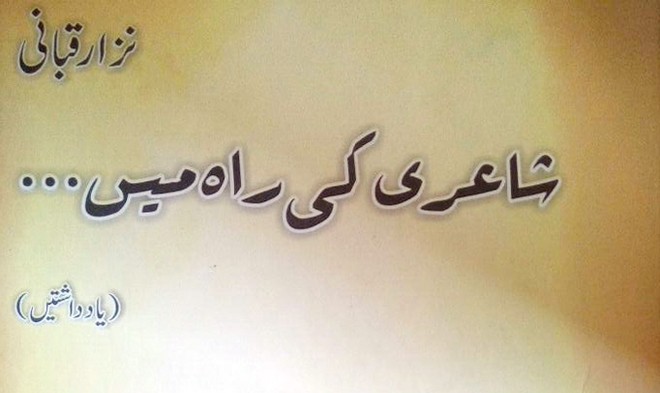
Nizar Qabbani’s memoirs are now available in an Urdu translation

"There is no lesson that needs to be told to others nor do I plan to embark on delivering a lecture. All that I want is to pass a bit of leisure time with my readers, even going to the beach and enjoying there."
Once the readers know the intentions of the writer who happens to be the one of the most venerated Arab poet, they can move on without hesitation. There is no sermonising as the writer just needs the company of the readers -- to let them see what made him the most loved poet of Arabic with a huge fan following throughout the world.
Nizar Qabbani (1923-1998) continues to mesmerise poetry lovers throughout the world and, in all likelihood, will continue to do so. The songs of love, rejection, alienation, and nationalism make him a poet of universal appeal. Here, he is at his best in his memoirs that he wrote in Arabic and our talented translator, Abu Umash (not an Arab at all), pen name of a Pakistani journalist who has extraordinary expertise in Arabic, has rendered it into Urdu under the title Shairi Kee Rah Mein.
Reading the translation, one feels as if Nizar Qabbani plays with words just like an ace magician who dazzles the audiences by pulling out a pigeon from his hat. In his memoirs, Qabbani shares all: his early influences, the city of Damascus of his times, his family, friends and foes, the institutions he attended and so on. Poetry, he declares, is in the blood of the Arabs and there is no escape from it. "In my county to be a poet is no miracle at all but not being a poet is". He goes on to say that we are under the influence and spectre of poetry and we are bound to compose poems as "it’s in our DNA". He doesn’t have any theory in poetry. For him, poetry is tantamount to dancing with words and nothing else.
Nizar Qabbani tells movingly and nostalgically about his father who was a sweets-seller as well as a worker of the freedom movement. His father was put behind bars for his revolutionary activities and Qabbani lashes out at those who accused him of having a bourgeois background. He was a proud son of a petty bakery owner who braved many difficulties in the freedom movement and nothing else.
After attending the National Science College in Damascus, Qabbani was trained as a lawyer against his wishes. He used to write poems on his law books during the lectures; he composed one of his sensuous poems while sitting in a law classroom. In 1944, when his first poetry book came out, it was vehemently rejected by critics who refused to accord him any importance at all. His bold tone and sensuousness attracted many young people who memorised the whole book -- a fact which Qabbani boastfully shares with the readers.
He joined the diplomatic service and served in many countries like Lebanon, Egypt, Spain, and a few other countries. Like any sentient artist, he assimilated the influences of other civilisations and this further enriched his poetry. Bold themes and sensual inclination earned him the name of ‘poet of women’ which he strongly disapproved. To draw boundaries for a poet or to tag a sticker is doing great injustice to him or her.
Qabbani was attacked by the so-called custodians of ethics in Damascus. They labelled his poetry as obscene but he stood firm and adamant. He explains that his society has relegated the subject of love as a taboo but he didn’t care about their opposition. He boldly declares that we are scared of the women’s bodies and that is why we criticise them and apply concocted principles of good and bad on them. Men are supposed to be possessed with ‘good character’ and no moral principles are applicable to them, Qabbani strikes back: "Men can only dictate orders on others; they can’t be dictated to follow certain orders in our societies".
Shairi Kee Rah Mein should be read by all those who are besotted with the dance of the words and those who want to learn how the master poet makes the words dance. Abu Umash has done a remarkable job of rendering the memoirs into Urdu from Arabic. Syed Kashif Raza, an unusual poet and a budding scholar, has written a cogent piece at the start of the memoirs which amply introduces Nizar Qabbani as well as the recluse translator Abu Umash. The publisher should have published the book in a reader-friendly font.